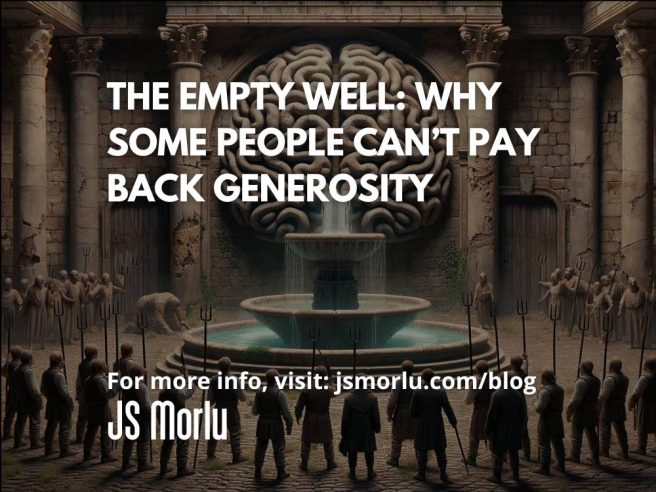By: John S. Morlu II, CPA
Let’s be brutally honest: not everyone has the capacity to reward what you give. Some people are emotional empty wells — no matter how much water you pour, it disappears into the cracks, leaving you standing there with your bucket like a fool.
Seneca nailed it centuries ago: “The reward of a good deed lies in the deed itself.” Translation: if you’re doing kindness for applause, flowers, or a thank-you card, you’re setting yourself up for misery. Expecting gratitude from someone who lacks empathy is like asking a hyena to respect veganism. It’s not going to happen.
Fun Fact Break #1 – The Roman Reminder
Did you know that in ancient Rome, benefactors didn’t trust people’s memories one bit? That’s why they built fountains, aqueducts, and theaters with their names carved deep into marble. It wasn’t just vanity — it was insurance. They knew people forget favors faster than they forget their passwords.
Even Julius Caesar knew this game. He threw gladiatorial games not just to “entertain” but to etch himself into collective memory. Bread and circuses weren’t just charity — they were receipts. Gratitude has always needed branding, otherwise people will consume your gift and erase your name from the story.
And here’s the punch: the moment the next emperor came along with bigger games or more bread, Caesar’s generosity was forgotten like yesterday’s gossip. People don’t keep gratitude tabs — they keep hunger tabs.
Preconventional Morality: The Gratitude Killer
Psychologist Lawrence Kohlberg laid it out with his “stages of moral development.” Most people are stuck at the preconventional level — survival mode. They only ask one question: What’s in it for me right now? That’s it.
Forget empathy, loyalty, or reciprocity. If giving doesn’t come with an immediate bribe or punishment, they don’t care.
Example: You pay your cousin’s rent. A month later, they ghost you when you need help moving. Why? Because to them, your kindness was just a short-term meal ticket, not a relationship contract. In their minds, gratitude expired the moment the fridge filled with groceries.
It’s the same mindset you see in children: “I’ll behave if I get candy.” Except some people never grow past that stage. They just swap candy for rent, gifts, promotions, or emotional attention. You’re waiting for adult morality from people still mentally trading Pokémon cards.
And here’s the kicker — if you expect them to “balance the ledger” later, you’re the one setting yourself up for misery. It’s like loaning a pen to someone who can’t read. They don’t even know what to do with it, let alone how to return it.
Real-World Examples of Empty Wells
- Corporate Version: You burn yourself out fixing a coworker’s botched report at 2AM. Next day in the meeting, they “forget” to mention your name. Instead, they bask in praise like a lizard in the sun. That’s not oversight. That’s moral bankruptcy dressed in business casual.
- Family Version: You drive five hours to bail out your brother after his latest “entrepreneurial” disaster. Two months later, he tells the family you never supported him. Congratulations — you’ve just financed his revisionist history.
- Romantic Version: You give and give to a partner who treats relationships like a vending machine. Press A3 (buy them something), and maybe you get a smile. Forget one purchase, and suddenly you’re accused of being neglectful.
- Friendship Version: You lend a friend your car for a week because theirs is in the shop. When you ask them for a ride six months later, they act like you’re asking them to donate a kidney. Empty well. Dry bucket. Lesson learned.
- Workplace Bonus Round: Ever notice how managers give “exposure” instead of money? That’s the corporate version of empty wells. Exposure doesn’t pay bills — it just means more people will know you got nothing.
- Philanthropy Twist: Billionaires donate a hospital wing, and the plaque goes up. Three years later, the public is demanding they pay more taxes because the “wing wasn’t enough.” Gratitude, ladies and gentlemen, has a shorter lifespan than a housefly.
Fun Fact Break #2 – Brain Science of Gratitude
Psychologists have actually studied gratitude in the brain. People with low empathy show less activity in the medial prefrontal cortex — the region tied to social rewards and moral decision-making. Translation: you’re waiting for a thank-you note from someone whose brain is basically on airplane mode when it comes to appreciation.
Another study found that when people recalled times they were helped, many forgot the specifics — but vividly remembered every single time they had helped others. Why? Because the brain hoards evidence of its own goodness but deletes the receipts of what it owes.
So when you’re baffled by someone who can’t say “thanks,” understand: you’re not dealing with a bad memory, you’re dealing with a biological short-circuit. Gratitude is optional software, and most people never downloaded the update.
The Common Sense Law of Generosity
Here’s the brutal truth:
1. Give without expecting. The moment you attach gratitude to your kindness, you’ve handed your happiness to someone who may not even own an emotional toolbox.
2. Recognize empty wells early. If you keep drawing water and nothing comes back, stop lowering the bucket. Empty wells don’t fill themselves.
3. Don’t confuse silence with malice. Some people simply don’t know how to express gratitude. But if you see a consistent pattern of entitlement, that’s not ignorance — that’s exploitation.
4. Reframe the reward. Your act is the reward. Helping without strings is like strength training for the soul. The muscles grow whether or not the gym thanks you for showing up.
5. Upgrade your radar. Start watching actions, not words. “Thanks” is cheap. Reciprocity is expensive. If people never pay in action, they’re just talkers with moral debt.
6. Practice selective generosity. Not everyone deserves an open tab on your time, money, or effort. Charity without boundaries is not generosity — it’s a subsidy for irresponsibility.
Humor Punchline
Generosity without boundaries is like Netflix password sharing — it feels good at first, but eventually someone’s cousin in another country is watching Narcos on your account while you’re the one paying the bill.
And if you cut them off? Suddenly you’re the villain. That’s the empty well paradox: they drink your water, spit in the bucket, and then call you stingy when you stop lowering the rope.
Fun Fact Break #3 – Gratitude Has an Expiration Date
In medieval Europe, kings gave land and titles as “gifts.” Were peasants grateful? Sure — until famine hit. Then they stormed the castles with pitchforks. Gratitude has an expiration date shorter than milk left out in the sun.
Fast forward to today. Companies give year-end bonuses, and by February, employees are already on Glassdoor complaining the bonus wasn’t enough. Gratitude fades faster than New Year’s resolutions.
Politics, too, is a graveyard of forgotten favors. A president builds a highway, and within five years, the same voters are demanding new bridges because the old ones have potholes. Gratitude is like chewing gum — the flavor doesn’t last long, and the chewing never stops.
The Incredible Punching Link
So here’s the kicker: stop expecting thank-yous from people who can’t even say “excuse me” when they burp. The act itself — your integrity, your kindness, your decision to rise above pettiness — is the dividend.
Waiting for empathy from an empty well is like waiting for Wi-Fi in a cave. You’ll just sit there, staring at “No Connection,” growing bitter.
Remember this: gratitude is a bonus, not a guarantee. The real power lies in knowing that you acted with dignity, not because they deserved it, but because you do.
That’s the Roman fountain. That’s Seneca’s wisdom. That’s common sense with a little bit of satire sprinkled on top.
Author: John S. Morlu II, CPA is the CEO and Chief Strategist of JS Morlu, leads a globally recognized public accounting and management consultancy firm. Under his visionary leadership, JS Morlu has become a pioneer in developing cutting-edge technologies across B2B, B2C, P2P, and B2G verticals. The firm’s groundbreaking innovations include AI-powered reconciliation software (ReckSoft.com) and advanced cloud accounting solutions (FinovatePro.com), setting new industry standards for efficiency, accuracy, and technological excellence.
JS Morlu LLC is a top-tier accounting firm based in Woodbridge, Virginia, with a team of highly experienced and qualified CPAs and business advisors. We are dedicated to providing comprehensive accounting, tax, and business advisory services to clients throughout the Washington, D.C. Metro Area and the surrounding regions. With over a decade of experience, we have cultivated a deep understanding of our clients’ needs and aspirations. We recognize that our clients seek more than just value-added accounting services; they seek a trusted partner who can guide them towards achieving their business goals and personal financial well-being.
Talk to us || What our clients says about us




